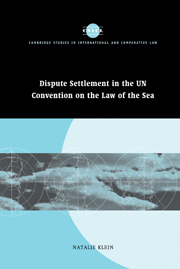Book contents
- Frontmatter
- Contents
- Acknowledgements
- List of Abbreviations
- Table of treaties and other international instruments
- Table of cases
- 1 Introduction
- 2 The Dispute Settlement Procedure under UNCLOS
- 3 Limitations on Applicability of Compulsory Procedures Entailing Binding Decisions
- 4 Optional Exceptions to Applicability of Compulsory Procedures Entailing Binding Decisions
- 5 Deep Seabed Mining
- 6 Conclusion
- Bibliography
- Index
- CAMBRIDGE STUDIES IN INTERNATIONAL AND COMPARATIVE LAW
4 - Optional Exceptions to Applicability of Compulsory Procedures Entailing Binding Decisions
Published online by Cambridge University Press: 04 July 2009
- Frontmatter
- Contents
- Acknowledgements
- List of Abbreviations
- Table of treaties and other international instruments
- Table of cases
- 1 Introduction
- 2 The Dispute Settlement Procedure under UNCLOS
- 3 Limitations on Applicability of Compulsory Procedures Entailing Binding Decisions
- 4 Optional Exceptions to Applicability of Compulsory Procedures Entailing Binding Decisions
- 5 Deep Seabed Mining
- 6 Conclusion
- Bibliography
- Index
- CAMBRIDGE STUDIES IN INTERNATIONAL AND COMPARATIVE LAW
Summary
Introduction
Article 298 of the Convention allows for States parties to exclude certain categories of disputes from compulsory procedures entailing binding decisions. States may declare when signing, ratifying, or acceding to the Convention, or at any time thereafter, that they do not accept the procedures available under Section for those disputes specified in Article 298. The declaration is without prejudice to the consent-based procedures set out in Section 1 of Part XV. While a State is entitled to withdraw its declaration, a State may not submit a dispute subject to a declaration to any procedure under the Convention without the consent of the other State.
Declarations permitted under Article 298 relate, first, to maritime delimitation disputes in relation to the territorial sea, EEZ, or continental shelf of States with opposite or adjacent coasts, as well as disputes involving historic bays or title. Second, States may opt to exclude disputes relating to military activities, as well as law enforcement activities relating to marine scientific research and fishing in the EEZ. Finally, disputes in respect of which the Security Council is exercising its functions under the UN Charter may also be excluded from compulsory procedures entailing binding decisions at the election of States. This chapter explores these categories of disputes and the role that dispute settlement is expected to play and what justifications can be posited for the possible exclusion of these disputes.
- Type
- Chapter
- Information
- Dispute Settlement in the UN Convention on the Law of the Sea , pp. 227 - 316Publisher: Cambridge University PressPrint publication year: 2005



